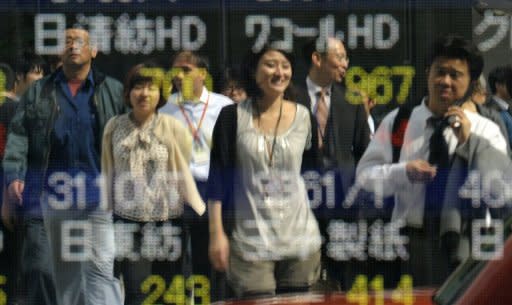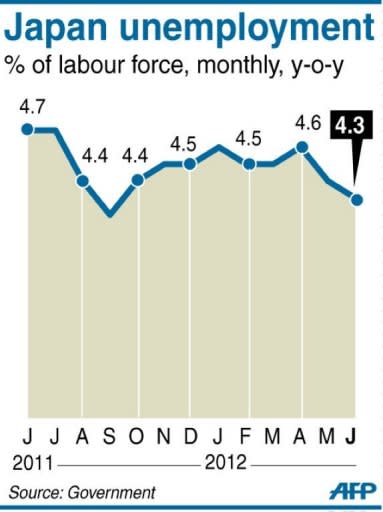Japan jobless rate down as households boost spending
Japan's unemployment rate edged down in June while households loosened their purse strings, offering a glimmer of hope for the nation's fragile economy. But the positive data was tempered by figures on Monday that showed factory output turned down unexpectedly last month, stoking concerns that turmoil overseas is increasingly hurting the world's third-largest economy. On Tuesday, official data showed the nation's unemployment rate hit 4.3 percent last month, down from 4.4 percent in May and beating market forecasts that Japan's jobless rate would remain unchanged, Dow Jones Newswires said. Separate data from the internal affairs ministry showed Japanese households boosted spending last month. "Japan's job market continued to improve in line with a gradual recovery of the nation's entire economy," said Naoko Ogata, a senior economist at Japan Research Institute. The job market improvement was partly due to growing demand for jobs in northeastern Japan, where reconstruction was in full swing following last year's quake-tsunami disaster, analysts said. Average household spending in June came in at 269,810 yen ($3,450), up 1.6 percent from a year earlier, but lower than the 2.9 percent rise forecast by economists. "All in all, the Japanese economy is still on course to recovery, led by improvement in domestic consumption," Ogata said. "But an end to auto incentives later this year may dampen consumers' sentiment," she added, referring to temporary government subsidies for eco-friendly cars. Ogata also said a strong yen was a negative for Japan's economy as it makes exporters products pricier overseas while shrinking the value of firms' foreign earnings. Many Japanese firms have blamed weaker quarterly earnings on huge foreign-exchange losses. On Monday, data showed Japan's factory output was down 0.1 percent in June, well short of market expectations for a 1.6 percent rise. The output decline came amid growing fears about the fiscal situation in Europe -- a major market for Japanese products -- and the strong yen hurting demand. Japanese industry is also facing major challenges after the country shut down its nuclear reactors in the wake of last year's atomic crisis, with industrial users being asked to make deep cuts in energy consumption. All 50 of Japan's nuclear power stations were switched off after the March 11 tsunami, which swamped reactors at the Fukushima Daiichi plant and sent them into meltdown. Despite widespread anti-nuclear sentiment the government later approved a plan to restart two reactors, which have now come online.



